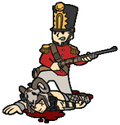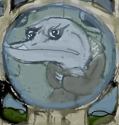|
The Merry Marauder posted:Very. But there were a few things the ships would do to help, such as turning just before recovery to let the wake smooth the water, and landing/hooking onto a canvas drogue that could be winched close aboard, where the crane would do its work. To be fair, IIRC, that's a Kingfisher that landed, rescued the aircrew from a ditched aircraft (that doesn't float,) and then waited for its mothership to come pick it up. The Kingfisher only had a crew of two.
|
|
|
|

|
| # ? Jun 26, 2024 12:53 |
|
Oh, sure. If it wasn't clear, the floatplanes fairly regularly picked up downed aircrew from non-floatplanes. I'm pretty sure they usually taxied to their ship, but I imagine it depends on the sea state.
|
|
|
|
100 Years Ago The intensity of the German attack between Bixschoote and Dixmude is so great that French intelligence now believes that's where they intend to try for a breakthrough, and rush reserves north. Both towns fall, and the French fall back to the line of the Ypres-Comines canal, deepening the salient. The Menin Road takes a pasting as well. The line wobbles. On the south edge of the salient, the French cop another attack, and now all their reserves have been sent north... Meanwhile, the Russians settle in to starve out the Austro-Hungarian fortress of Przemysl; and the Telegraph confidently informs its readers that the Germans have just run out of men.
|
|
|
|
The Merry Marauder posted:Oh, sure. If it wasn't clear, the floatplanes fairly regularly picked up downed aircrew from non-floatplanes. Funny. I thought they used Catalinas for stuff like that, so you could just pull 'em into the hull.
|
|
|
|
Depends what's there. If a cruiser's floatplane is nearby a ditch, it might not be prudent to wait.
|
|
|
|
Most non-carrier naval aircraft were floatplanes (ex. the Vought Kingfisher)or seaplanes (ex. the Supermarine Walrus). These aircraft had a great deal of utility, which made them attractive to early 20th-century navies. They could be used for scouting, naval gunfire spotting, air-sea rescue, and liaison work. By the start of World War II, many cruisers and battleships carried aircraft. Plus, most fleets had seaplane tenders to support larger seaplanes like the PBY Catalina. During the early years of naval aviation, navies tried all kinds of schemes for launching and recovering naval aircraft. One idea was to fit ships with "flying-off platforms." Eugene Ely used a simple flight deck to make his pioneering takeoff from USS Birmingham in 1910 and made an arrested landing on a similar platform in 1911 on USS Pennsylvania. The British did something similar in 1912, when they launched a floatplane off of HMS Hibernia.  Another example of a flying-off platform, this time with a Sopwith 1 1/2 Strutter off of HMAS Australia  This setup showed some promise. With a 20 knot headwind, light aircraft like the Sopwith Pup could take off in just 20 feet. In August 1917, RNAS Flight Sub-Lieutenant B. A. Smart flew a Sopwith Pup off HMS Yarmouth's small flying-off platform and then shot down a Zeppelin flying at 7,000 feet. Following procedure, Smart then ditched his Pup in the sea and was rescued (his plane sunk). SeanBeansShako posted:For some reason, I was imagining a system with airbags under the wings. Like floaties, but for planes! There's actually some truth to this! Some Pups carried fuselage-mounted airbags, although these didn't work especially well. In April 1917, RNAS Squadron Commander H.R. Busteed invented an improved system* to save ditched aircraft. Busteed's system used a jettison-able undercarriage (the fixed landing gear of Pups made them suspectible to flipping over during ditching) and a set of airbags mounted on the Pup's lower wings. This allowed the Pup to float for about 20-30 minutes, long enough for a surface ship to rescue man and machine. Other aircraft simply used the sea as their runway. The Royal Navy's first sea/floatplane carrier, HMS Hermes and later vessels like HMAS Albatros used large cranes to winch an aircraft into the sea. The aircraft would then take off, fly its mission, and return to the sea where it would be winched back onto its home ship. This system did have some drawbacks, though. Sea takeoffs can be difficult in very calm or very rough seas. Plus, sea takeoffs limited the max takeoff weight (and thus the effective range) of sea/floatplanes, which in turn limited their effectiveness as scouts. You can see a float-plane crane at work onboard the battleship USS Missouri as it recovers a Vought Kingfisher.  So, naval designers invented an improved launch system: the catapult. They became standard pieces of equipment for floatplane-carrying warships (ex. heavy cruisers) as well as for traditional "flattop" aircraft carriers.   German airline Lufthansa even got in on the game. During the inter-war years, they operated several Katapultschiffs (catapult ships) to recover, refuel, service, and launch aircraft flying to Africa and Latin America.   However, catapults still sent some pilots on a one-way trip. During the Battle of the Atlantic German maritime patrol aircraft like the FW200 Kondor would shadow convoys relaying their position to U-Boat wolfpacks. In a desperately resourceful bid to combat the Luftwaffe, the Royal Navy invented Fighter Catapult Ships and Catapult Aircraft Merchantmen (CAM). Fitted with rocket-propelled catapults, these ships would launch Hawker Sea Hurricane or Fairey Fulmar fighters from their bows. After completing his mission, the pilot would either bail out, ditch, or fly his aircraft to shore. In their short service life, fighters from CAMs managed to shoot down eight or nine Luftwaffe aircraft (accounts vary), although they were soon replaced by escort carriers.   *see page 10 Bacarruda fucked around with this message at 23:48 on Nov 10, 2014 |
|
|
|
Saw this in the Comic Strip Megathread, Hey Gal came to mind for some reason.
|
|
|
|
The history of the BEF in the opening weeks of WW1.
|
|
|
|
|
Grand Prize Winner posted:Funny. I thought they used Catalinas for stuff like that, so you could just pull 'em into the hull. They did. US Navy PBYs and the Army's OA-10 versions flew as "Dumbos," rescuing downed airmen. The US Navy also used the Martin PBM Mariner for rescue work. But rescue wasn't the exclusive preserve of the big seaplanes. The Army Air Force also flew SB-17s and the SB-29 "Super Dumbos" for rescue operations. Although they couldn't land to rescue crews, they could air-drop a lifeboat to save men in the water. Smaller aircraft were also used for rescue operations. The Vought OS2U Kingfisher was routinely used to rescue lost aircrews. The Merry Marauder posted:I'm pretty sure they usually taxied to their ship, but I imagine it depends on the sea state. Kingfishers weren't roomy, but they could take off with up to four people aboard. LT(jg) Rollin Batten, Jr. won the ]Navy Cross for rescuing two men off Guam while under fire. His Kingfisher is now in the Smithsonian. In these photos, you can see rescued aviators sitting in the back seat, while the radioman/observer stands on the wing to secure the aircraft to the crane cable.   Taxiing was rough on the airframe and there's several incidents of Kingfishers sinking after trying to taxi in heavy seas (see the Truk story below). From what I've read, Kingfisher pilots generally tried to fly back to rescue vessels, rather than try a time-consuming and risky taxi operation. Although there are cases of Kingfishers cruising over to submarines to drop off rescued men (see below). MrYenko posted:To be fair, IIRC, that's a Kingfisher that landed, rescued the aircrew from a ditched aircraft (that doesn't float,) and then waited for its mothership to come pick it up. The Kingfisher only had a crew of two. The "Truk Taxi" incident shown in the photo is quite a bit more dramatic than that. As you can see, it's sinking, has nine men clinging to it, and its mothership (the battleship USS North Carolina) isn't nearby and isn't coming. This Kingfisher was taking part in search and rescue operation during TF 58's April 1944 raid on Truk Lagoon when things got...interesting. In the aftermath of the raid, a large rescue operation was underway, including two Vought Kingfishers and Dick O'Kane's submarine, the USS Tang. All would play important roles in the "Truk Taxi" drama. In the first Kingfisher, Lieutenant John Dowdle, Jr. and radioman Robert Hill spot an F6F Hellcat pilot in the water. They've been ordered to pick up downed aircrew, so Dowdle and Hill land to rescue the stricken airman. Moments later, a gust of wind capsizes their Kingfisher, forcing them into the water. In the second Kingfisher (the plane from the photo) LT(jg) John Burns and his radioman, Aubrey Gill, spot Dowdle's plight. Braving five-foot swells, Burns landed to rescue the three airmen. Since he had three people clinging to his wings, Burns couldn't take off. Luckily, Tang had surfaced nearby, so Burns taxied over to Tang and dropped them off. Burns took off again, only to spot another Hellcat pilot in the water. Burns landed and scooped him up. Meanwhile, two TBF Avengers ditch near Burns. Their crews scrambled out of their sinking planes and into their rafts. Now having a very busy day, Burns taxis over to them so Gill can throw them a tow line. Then, Burns tried to tow the Avenger crews over to Tang, but he quickly realizes that has a problem. The heavy seas and his propwash are foundering the liferafts. Burns and Gill told the Avenger crewmen to climb onto his plane. Now Burn's plane has seven people clinging to the wings and fuselage. Then things get even worse. The Kingfisher starts sinking. Under constant pounding from heavy swells, the Kingfisher's pontoon had sprung a leak.  Luckily for Burns and his survivors, O'Kane had spotted their plight. Tang dashed to rescue the airmen. After taking off Burns and his charges, O'Kane scuttled the little seaplane with gunfire. Burns won a very well-deserved Navy Cross for his heroism. Here's Dick O'Kane (center), Burns, Gill, Dowdle, and Hill, along with the other airmen Tang rescued on her war patrol.  Anyone interested can read more about the Truk rescue here. It's quite an interesting story. Bacarruda fucked around with this message at 23:54 on Nov 10, 2014 |
|
|
|
We also have more advanced solutions for launching and retrieving scout aircraft these days.  The ScanEagle basically flies into a taut string with the end of a wing, then the string slides down the curved wing to the end, where it enters basically a carabiner, and spins around the string to lose momentum. https://www.youtube.com/watch?feature=player_detailpage&v=7bbasMvXZJo#t=104
|
|
|
|
Keldoclock posted:We also have more advanced solutions for launching and retrieving scout aircraft these days. And I thought the Royal Navy was crazy... https://www.youtube.com/watch?v=f7Lu6LEQ0zo
|
|
|
|
Nenonen posted:Saw this in the Comic Strip Megathread, Hey Gal came to mind for some reason. Rabhadh posted:a lot of the native soldiers operation in Ireland in 1600 look outlandish to their English opponents and Spanish allies... quote:Yep Wallenstein was killed by Irish and Scottish officers. Trczka, on the other hand, decided to take a bunch of dudes with him out in the courtyard. It took a few to bring him down. Because he was a large man and unusually strong, or because he was a wizard? I know which one his contemporaries picked. HEY GUNS fucked around with this message at 00:08 on Nov 11, 2014 |
|
|
|
HEY GAL posted:Are there any recorded incidents of the Spanish being...nonplussed by all this Irishness? The 17th century Spanish I'm familiar with are up their rear end with a sense of their own dignity, and I'm imagining an exchange between one of them and an Irish and it's pretty funny. The Irish were "good Catholics", at least as long as the money was flowin'
|
|
|
|
^^^^ Nothing has changed. Rabhadh posted:Irish and Scottish guys get mixed up a lot partly because the Latin name for the Irish is the Scoti. Of course this assumes a greater degree of access to information than the average dude in Holy Roman Empire probably had so... 
|
|
|
|
Arquinsiel posted:^^^^ I'm pretty sure there's some migration poo poo going on as well that confuses matters as well. I'm blanking on the details of it, I just remember it all getting muddled up around the 17th century back when I looked up what the gently caress was up with the Scotts-Irish.
|
|
|
|
SeanBeansShako posted:Did they ever develop a way to somehow retrieve scouting aircraft that used the catapult system after launch? Depends what you mean by scouting aircraft. If you mean seaplanes like the Kingfisher or the Walrus, they would land next to the ship they were launched from and be hoisted back on boat. HEY GAL posted:Are there any recorded incidents of the Spanish being...nonplussed by all this Irishness? After the Armada's stragglers reached the Irish coast there were lots of nonplussed Spaniards. The Irish took great relish in capturing and ransoming the richest of the nobles and killing everyone else. A few lucky ones got sent along to Scotland, but most ended up being killed. How much was due to their Elizabethan overlords and how much was the Irishmen acting on their own account is left up to the reader. Vincent Van Goatse fucked around with this message at 02:04 on Nov 11, 2014 |
|
|
|
Trin Tragula posted:100 Years Ago https://www.youtube.com/watch?v=jTiqVtL7uDo&list=UUShQwaYMurWOQAsDYD8REew
|
|
|
|
Trin Tragula posted:"You know, the leech comes to us on the highest authority!" Leeches loving own, when used correctly. Bleeding people in and of itself isn't correctly, but leech saliva is a magical substance.
|
|
|
|
Cyrano4747 posted:I'm pretty sure there's some migration poo poo going on as well that confuses matters as well. I'm blanking on the details of it, I just remember it all getting muddled up around the 17th century back when I looked up what the gently caress was up with the Scotts-Irish.
|
|
|
|
HEY GAL posted:...Why? Because a well-placed charge can destroy any orderly formation
|
|
|
|
What language did Entente forces in WWI use when coordinating maneuvers? What language did they use for placenames? Did they bother coordinating this sort of stuff at all? I can imagine there being some issues if one unit is ordered to march towards Li�ge and another is ordered to Luik, for example.
|
|
|
|
Oh man this thread is great. Does anyone have any good sources on the Hussite Civil Wars/Hussite Crusades/Jan Zizka in English? Based on the little I know about him he seems like one of history's truly great commanders, but I haven't found that much, relatively speaking, about him and his wars on the English-speaking internet and I don't know Czech.
|
|
|
|
I put together a little infopost on imgur about the Shrine of Remembrance in Melbourne, which turns 80 today. Sadly I got there at 11am (minutes silence) and missed some of the preceeding ceremonies and the newly opened underground wing of the Shrine was very dark for handheld photos. http://imgur.com/gallery/IOGMb Here are a couple of pictures, more in the gallery above: The Dedication Ceremony for The Shrine of Remembrance was held on the morning of November 11th, 1934 in front of 300,000 people, representing approximately a third of Melbourne's population at the time. Allegedly it was the largest crowd ever to assemble in Australia to that date. The WW2 memorial courtyard was later built to the north, replacing the reflection pool. The Melbourne Royal Botanical Gardens and Melbourne Observatory are to the top of the image  A postcard with the following message written on the back: "This ray of sun light only shines like this at 11 am on the 11th of November & at no other time of any other day." Although there is now an artificial light that shines down at 11am every other day of the year.  Victory in the Pacific memorial service, 16 August 1945 Crowds gather at the Shrine the day after the Second World War ended.  drunkill fucked around with this message at 08:14 on Nov 11, 2014 |
|
|
|
ALL-PRO SEXMAN posted:After the Armada's stragglers reached the Irish coast there were lots of nonplussed Spaniards. The Irish took great relish in capturing and ransoming the richest of the nobles and killing everyone else. A few lucky ones got sent along to Scotland, but most ended up being killed. How much was due to their Elizabethan overlords and how much was the Irishmen acting on their own account is left up to the reader. Quite a few ended up being hired on by local Irish lords to train their private armies actually, a formation of Irish pike and shot appears in Mayo (west coast) in 1590 armed with weapons taken directly from the armada ships themselves. They had 20 Spaniards in the company, no doubt acting as officers. Guns were common enough in Irish warfare at this point for there appearance here to be considered unsurprising, it's the formation itself that's new (and revolutionary) on the Irish battlefield. Later in 1590, the Burkes of Mayo and their shiny new army broke into rebellion. It's really dependent on the individual lord whether the Spanish survivors get killed or even just reported as killed, for example, Tadgh O'Flaherty of Connemara was heavily involved in rounding up Spaniards after the Armada, but after joining the Burkes in their rebellion of 1590 he appears "trading shot with Captain Edward Birmingham and then coming to a push of pike". In addition, in 1591 O'Connor of Sligo had 24 Spaniards training his kern, also equipped with weapons taken directly from the armada ships. I imagine the nobles are all ransomed already. The killing of Spaniards in Ireland doesn't seem to have soured the relationship with the Spanish at all really. It appears that Spanish influence on O'Neill's army in the 1590's was the reason for the high number of rodeleros (sword and bucklermen) he employed (English didn't use swordsmen), as pikemen were considered "unwieldy in woods and scrubbed ground, and vulnerable to shot and targets" (written in 1593). The Ulster lords primary converted their gallowglass into pikes while their kern were trained up as shot first and rodeleros second, O'Neill tried to maintain a ratio of 5:1 shot to pikes.
|
|
|
|
HEY GAL posted:Another good flag was a hedgehog with the motto I AM ENFOLDED IN MY VIRTUE. If you can find a picture of this, I'd love to see it. I have a friend who raises hedgehogs.
|
|
|
|
100 Years Ago For the second time in as many weeks, the Germans break the British line on the Menin Road. Even if the situation today is possibly (when looked at coldly and objectively) somewhat less serious than the previous break of the line, it's still hard to resist the urge to attempt some sort of profound connection along the lines of "today the war is saved, four years from now the war is won". Especially when you consider that the BEF is now so low on men that the inevitable last-ditch counter-attack is primarily carried out by a scratch force of sappers, cooks, batmen, and other such people who are theoretically in the Army, but it isn't usually their job to do any of the actual fighting... (It's also a bad day to be Russian, as they get counter-attacked in Poland and in Anatolia both.) Ofaloaf posted:What language did Entente forces in WWI use when coordinating maneuvers? What language did they use for placenames? Did they bother coordinating this sort of stuff at all? I can imagine there being some issues if one unit is ordered to march towards Li�ge and another is ordered to Luik, for example. Quite a number of senior BEF officers spoke French to some degree or another just from the process of growing up as a gentleman, it was widely taught at the Staff College for those who hadn't, and those who aggressively didn't care used interpreters (who were always on hand to prevent misunderstanding). Theoretically, French and Dutch were both equally official languages in Belgium, but French was still the language of the power-brokers, and most maps used French names wherever they existed (smaller Flanders settlements usually didn't have one). So, the town now primarily called Roeselare was in those days always Roulers on military maps, but between it and Ypres were then small villages like Hollebeke, Zillebeke, Passchendaele and Zandvoorde. Not even the Belgians would have ordered reinforcements to Luik.
|
|
|
|
Trin Tragula posted:Quite a number of senior BEF officers spoke French to some degree or another just from the process of growing up as a gentleman, it was widely taught at the Staff College for those who hadn't, and those who aggressively didn't care used interpreters (who were always on hand to prevent misunderstanding)....
|
|
|
|
HEY GAL posted:In the 17th century, the Spanish armies use interpreters and so do the Imperial armies (one per regiment), but I've never seen any on the rolls anywhere else. They probably just expected you'd eventually pick a foreign language up, or expected you'd probably know standard German already. There's always the chance that the interpreters just aren't on the books. Didn't you talk about there being a train of non-affiliated-but-really-affiliated camp followers? Back when everyone was chuckling over the 'Whore Sgt" position? I could see some random guy they Doubly so if he was considered some officer's local servant or something like that.
|
|
|
|
What was the linguistics situation during WWII? For example, did western allied units operating in Normandy have interpreters capable of speaking French or German, or were any individual soldiers trained to have a passable understanding/were issued with phrasebooks? Or was it just a matter of gesticulating/shouting slowly?
|
|
|
|
Trin Tragula posted:100 Years Ago What are Batmen? Other than the plural of Batman, that is.
|
|
|
|
Low Ranking Officer Military Servants aren't they?
|
|
|
|
|
Cyrano4747 posted:There's always the chance that the interpreters just aren't on the books. Didn't you talk about there being a train of non-affiliated-but-really-affiliated camp followers? Back when everyone was chuckling over the 'Whore Sgt" position? I could see some random guy they And the "slut leader" is a respected office! He handles the baggage train, as you can see by the name. One per regiment. Edit: Also, there's a small cloud of people buying and selling poo poo that follow every army, but they wouldn't appear on anything official because they're not part of the army. Also also, the haulage subcontractors are their own thing that you hire, they're not military. So that's them as well... Fangz posted:What was the linguistics situation during WWII? HEY GUNS fucked around with this message at 22:29 on Nov 11, 2014 |
|
|
|
They would speak in Russian, but it was not uncommon for an officer to pick up the language of the area where his unit was stationed.
|
|
|
|
Don Gato posted:What are Batmen? Other than the plural of Batman, that is. A batman is a private soldier assigned to an officer (and his horse; the term comes from the now-obsolete sense of "bat", to mean a pack-saddle) as a personal servant. Until after the Second World War, it was commonplace for field officers (and some sergeants-major, depending on regimental tradition) in the British Army to have a batman, although the subalterns often had to share one between them. The contemporary German, French, and Russian armies also had a somewhat similar concept. The relationship between Frodo and Sam in The Lord of the Rings is a classic officer-batman relationship; it's one of the many things that Tolkien used from his time on the Western Front. It also wasn't unknown for officers who left the Army to employ their former batman as a member of the household staff; I'm told that Lord Grantham off Downton Abbey enjoyed the company of Master Bates so much in the Boer War that he made him his valet. Trin Tragula fucked around with this message at 22:06 on Nov 11, 2014 |
|
|
|
Fangz posted:What was the linguistics situation during WWII? Some soldiers would have spoken French and/or German already. Some of the Dutchmen in the Prinses Irene Brigade likely spoke passable German. And Dutch is broadly intelligible to German speakers, anyways. Most Belgians in the Briagde Piron spoke French as their native language. Same story with Canadians from Francophone parts of Canada. Some units also had first- or second-generation immigrants who already spoke French, Italian, or German. Easy Company's Joseph Liebgott is a good example of such a soldier. These men usually ended up as ad hoc translators and interrogators. Soldiers on both sides were also issued with phrasebooks. You can see an example of a US Army English-German book here. These books were usually an interesting combination of interrogation (Welches is Ihr Regiment? "What is your regiment?"), prisoner-handling (H�nde hoch! "Raise your hands!"), road signs (Parken verboten "No Parking"), weapon names (Granatwerfer "Mortar"), and small talk (Haben Sie Feuer? "Do you have a light?"). Reading it, you get the impression that the GIs carrying this phrasebook are a bunch of heavily-armed tourists... The US Army also issued phrasebooks in French, Dutch, and of all things, Portuguese (presumably to help GIs working with these guys). And for more detailed translation and military intelligence work, the US Army also issued military dictionaries, such as this German edition.
|
|
|
|
Bacarruda posted:And Dutch is broadly intelligible to German speakers, anyways. quote:These books were usually an interesting combination of interrogation (Welches is Ihr Regiment? "What is your regiment?"), prisoner-handling (H�nde hoch! "Raise your hands!"), road signs (Parken verboten "No Parking"), weapon names (Granatwerfer "Mortar"), and small talk (Haben Sie Feuer? "Do you have a light?"). Reading it, you get the impression that the GIs carrying this phrasebook are a bunch of heavily-armed tourists... HEY GUNS fucked around with this message at 22:53 on Nov 11, 2014 |
|
|
|
It might have been different in the 1940ies, when a large number of Germans in the north still spoke fluent Lower German. Dutch sounds a lot like it. Nowadays very few Germans still speak Lower German with any kind of fluency.
|
|
|
|
Bacarruda posted:Reading it, you get the impression that the GIs carrying this phrasebook are a bunch of heavily-armed tourists... This is very, very true and the Army straight up supported this view. I was just recently given a copy of the handbook given to US soldiers going through the Netherlands and in the intro it explicitly says something along the lines of "you have an amazing opportunity to see landmarks and cultural treasures that people in peacetime pay many hundreds and even thousands of dollars to visit. We highly encourage you to do so to the extent possible and allowed by your military duties." There then follows a bunch of stuff about how not to be an rear end in a top hat to the locals and a warning about how poo poo might be damaged, destroyed, or stolen and how all the maps are based on pre-war tourist materials so YMMV.
|
|
|
|
Bacarruda posted:Some soldiers would have spoken French and/or German already. Some of the Dutchmen in the Prinses Irene Brigade likely spoke passable German. And Dutch is broadly intelligible to German speakers, anyways. Most Belgians in the Briagde Piron spoke French as their native language. Same story with Canadians from Francophone parts of Canada. Personal anecdote, my grandfather was a Quebecois immigrant who ended up getting assigned as his unit's interpreter after they jumped into Normandy since 'they're Frenchies up in Canada, right?'  Apparently Quebecois <> Norman French worked out well enough, certainly better than a GI phrasebook. The one 'interacting with the locals' story I know is his unit ending up lodged in some French village overnight, and the family he was staying with was totally convinced that the Germans were going to sneak in after them and massacre the town. They pulled out all the heirlooms and jewelry they had managed to hide during the occupation and asked him to hide it somewhere on their farm without telling them, so the Germans couldn't torture it out of them when they made their dramatic return. He tried convincing them that the Americans were there to stay but they were utterly sure that stormtroopers would come jumping out the moment they left. Not knowing what else to do, he agreed...but he didn't want to end up hiding the jewelry where they'd never find it. So he stuffed it all under a sofa cushion. Pretty sure the Germans never got their hands on it.
|
|
|
|

|
| # ? Jun 26, 2024 12:53 |
|
HEY GAL posted:Everyone has told me this, but as someone who is bilingual in German and English, I can say that it is not true at all in my case. Nor can the Dutch people I meet understand German just from being Dutch. My German ex always told me she had a right poo poo time with the dutch language at first. People from the border areas though...
|
|
|





































